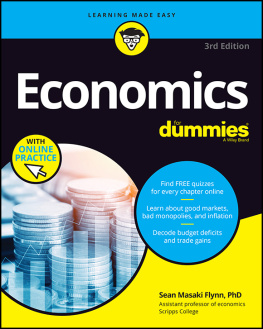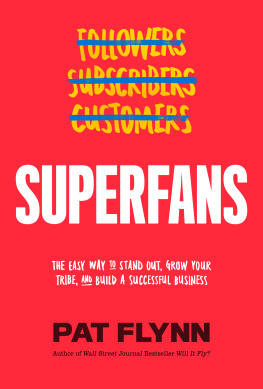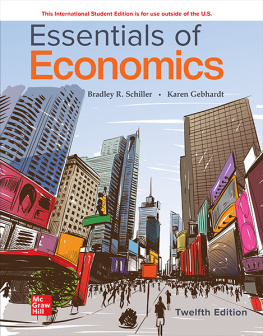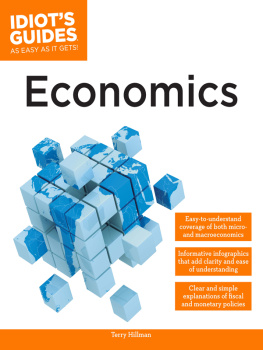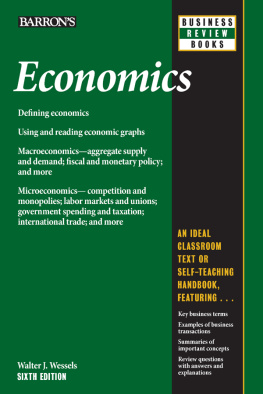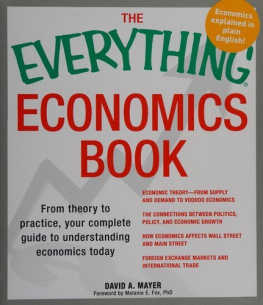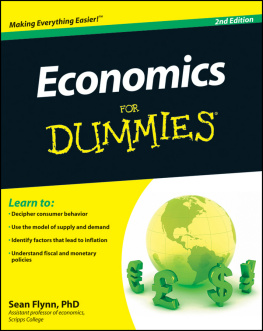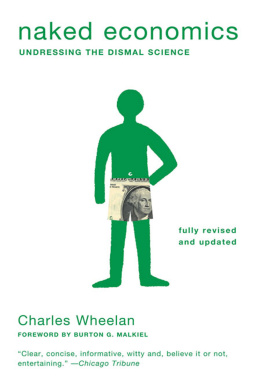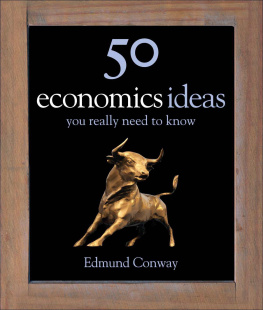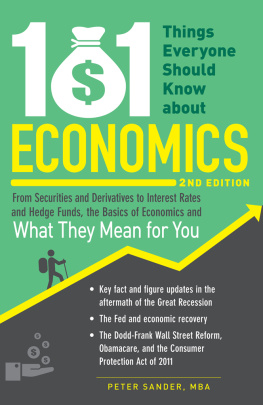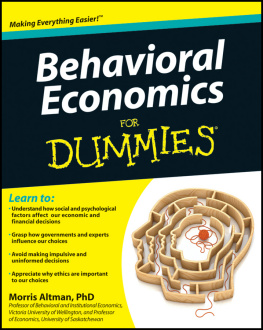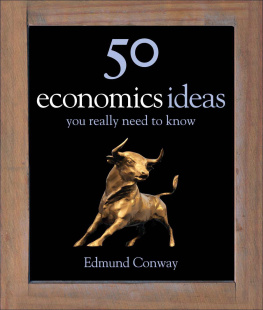

Economics For Dummies, 3rd Edition
Published by: John Wiley & Sons, Inc., 111 River Street, Hoboken, NJ 07030-5774, www.wiley.com
Copyright 2018 by John Wiley & Sons, Inc., Hoboken, New Jersey
Published simultaneously in Canada
No part of this publication may be reproduced, stored in a retrieval system or transmitted in any form or by any means, electronic, mechanical, photocopying, recording, scanning or otherwise, except as permitted under Sections 107 or 108 of the 1976 United States Copyright Act, without the prior written permission of the Publisher. Requests to the Publisher for permission should be addressed to the Permissions Department, John Wiley & Sons, Inc., 111 River Street, Hoboken, NJ 07030, (201) 748-6011, fax (201) 748-6008, or online at http://www.wiley.com/go/permissions .
Trademarks: Wiley, For Dummies, the Dummies Man logo, Dummies.com, Making Everything Easier, and related trade dress are trademarks or registered trademarks of John Wiley & Sons, Inc., and may not be used without written permission. All other trademarks are the property of their respective owners. John Wiley & Sons, Inc., is not associated with any product or vendor mentioned in this book.
LIMIT OF LIABILITY/DISCLAIMER OF WARRANTY: WHILE THE PUBLISHER AND AUTHOR HAVE USED THEIR BEST EFFORTS IN PREPARING THIS BOOK, THEY MAKE NO REPRESENTATIONS OR WARRANTIES WITH RESPECT TO THE ACCURACY OR COMPLETENESS OF THE CONTENTS OF THIS BOOK AND SPECIFICALLY DISCLAIM ANY IMPLIED WARRANTIES OF MERCHANTABILITY OR FITNESS FOR A PARTICULAR PURPOSE. NO WARRANTY MAY BE CREATED OR EXTENDED BY SALES REPRESENTATIVES OR WRITTEN SALES MATERIALS. THE ADVICE AND STRATEGIES CONTAINED HEREIN MAY NOT BE SUITABLE FOR YOUR SITUATION. YOU SHOULD CONSULT WITH A PROFESSIONAL WHERE APPROPRIATE. NEITHER THE PUBLISHER NOR THE AUTHOR SHALL BE LIABLE FOR DAMAGES ARISING HEREFROM.
For general information on our other products and services, please contact our Customer Care Department within the U.S. at 877-762-2974, outside the U.S. at 317-572-3993, or fax 317-572-4002. For technical support, please visit https://hub.wiley.com/community/support/dummies .
Wiley publishes in a variety of print and electronic formats and by print-on-demand. Some material included with standard print versions of this book may not be included in e-books or in print-on-demand. If this book refers to media such as a CD or DVD that is not included in the version you purchased, you may download this material at http://booksupport.wiley.com . For more information about Wiley products, visit www.wiley.com .
Library of Congress Control Number: 2018937401
ISBN 978-1-119-47638-2 (pbk); ISBN 978-1-119-47627-6 (ebk); ISBN 978-1-119-47632-0 (epdf)
Economics For Dummies
To view this book's Cheat Sheet, simply go to www.dummies.com and search for Economics For Dummies Cheat Sheet in the Search box.
Table of Contents
Guide
Pages
Introduction
Economics is all about humanitys struggle to achieve happiness in a world full of constraints. Theres never enough time or money to do everything people want, and things like curing cancer are still impossible because the necessary technologies havent been developed yet. But people are clever. They tinker and invent, ponder and innovate. They look at what they have and what they can do with it and take steps to make sure that if they cant have everything, theyll at least have as much as possible.
Having to choose is a fundamental part of everyday life. The science that studies how people choose economics is indispensable if you really want to understand human beings both as individuals and as members of larger organizations. Sadly, though, economics has typically been explained so badly that people either dismiss it as impenetrable gobbledygook or stand falsely in awe of it after all, if its hard to understand, it must be important, right?
I wrote this book so you can quickly and easily understand economics for what it is a serious science that studies a serious subject and has developed some seriously good ways of explaining human behavior out in the (very serious) real world. Economics touches on nearly everything, so the returns on reading this book are huge. Youll understand much more about people, the government, international relations, business, and even environmental issues.
About This Book
The Scottish historian Thomas Carlyle called economics the dismal science, but Im going to do my best to make sure that you dont come to agree with him. Ive organized this book to try to get as much economics into you as quickly and effortlessly as possible. Ive also done my best to keep it lively and fun.
In this book, you find the most important economic theories, hypotheses, and discoveries without a zillion obscure details, outdated examples, or complicated mathematical proofs. Among the topics covered are
- How the government fights recessions and unemployment
- How and why international trade is good for both individuals and nations
- Why poorly designed property rights are responsible for environmental problems such as global warming, pollution, and species extinctions
- How profits guide businesses to produce the goods and services you take for granted
- How economic incentives affect healthcare costs, prices, and efficiency
- Why competitive firms are almost always better for society than monopolies
- How the Federal Reserve controls the money supply, interest rates, and inflation all at the same time
- Why government policies such as price controls and subsidies often cause much more harm than good
- How the simple supply and demand model can explain the prices of everything from comic books to open-heart surgeries
You can read the chapters in any order, and you can immediately jump to what you need to know without having to read a bunch of stuff that you couldnt care less about.
Economists like competition, so you shouldnt be surprised that there are a lot of competing views. Indeed, its only through vigorous debate and careful review of the evidence that the profession improves its understanding of how the world works. This book contains core ideas and concepts that economists agree are true and important I try to steer clear of fads or ideas that foster a lot of disagreement. (If you want to be subjected to my opinions and pet theories, youll have to buy me a drink.)
Note: Economics is full of two things you may not find very appealing: jargon and algebra. To minimize confusion, whenever I introduce a new term, I put it in italics and follow it closely with an easy-to-understand definition. Also, whenever I bring algebra into the discussion, I use those handy italics again to let you know that Im referring to a mathematical variable. For instance, I is the abbreviation for investment, so you may see a sentence like this one: I think that I is too big.
I try to keep equations to a minimum, but sometimes they help make things clearer. In such instances, I sometimes have to use several equations one after another. To avoid confusion about which equation Im referring to at any given time, I give each equation a number, which I put in parentheses. For example,
(1)


